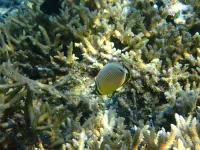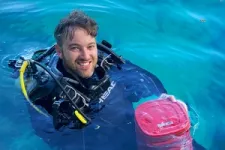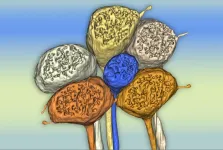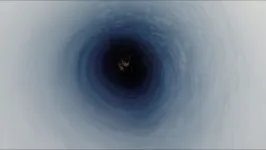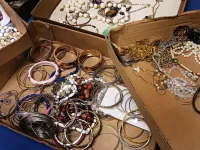Until recently, fish that consume algae and detritus — grazers — were thought to keep reefs healthy, and fish that eat coral — corallivores — were thought to weaken reef structures. The researchers found high levels of coral pathogens in grazer feces and high levels of beneficial bacteria in corallivore feces, which they say could act like a “coral probiotic.”
“Corallivorous fish are generally regarded as harmful because they bite the corals,” said Carsten Grupstra, a former graduate student at Rice and lead author of the open-access study in Frontiers in Marine Science. “But it turns out that this doesn’t tell the whole story.”
Grupstra received his doctorate in 2022, and is now a postdoctoral researcher at Boston University and Woods Hole Oceanographic Institution. In 2021, he, his doctoral adviser, Adrienne Correa, and others from her Rice research group discovered that feces of coral predators are packed with living symbiotic algae that corals depend upon.
The new study builds on that with data and evidence compiled from two years of field research and laboratory experiments at Rice and the Moorea Coral Reef Long-term Ecological Research station on the South Pacific island of Moorea, French Polynesia. The research showed corallivore feces contained many bacteria that are found in healthy corals under normal conditions. Grazer feces were both found to contain pathogenic bacteria and shown to damage or kill living coral fragments in controlled laboratory experiments.
To understand why corals might benefit from their predators’ feces, Grupstra said it is important to consider that coral-eating fish do not devour their prey. Ever wary of being eaten themselves, they spend their days repeating a simple two-step process: grab a mouthful, swim to a new location. Because they relieve themselves as they go, they naturally disperse poop — and any beneficial organisms it contains — over a wide area.
Grupstra said the new study suggests corallivore feces could be an important source of beneficial microbes for corals.
“It’s analogous to fecal microbiota transplantation therapy in humans,” Grupstra said.
The study examined bacteria from both corallivore and grazer feces, and compared their effects on live corals. The researchers began by collecting fresh feces from corallivores and grazers during research dives. They both assayed bacteria in the samples and conducted controlled experiments to see how each type of feces affected coral.
They placed pieces of coral in jars with microbe-free seawater. To some jars, they added fresh feces from either corallivores or grazers. To determine whether the physical characteristics of the feces alone might harm the coral, they sterilized some fecal samples and added them to other jars. To the final group of jars, an experimental control, nothing was added. At the end of the experiment, coral fragments from all jars were examined and categorized as apparently healthy, containing lesions or dead.
The experiments showed that some feces could kill or smother corals. In most cases, the effect was localized, producing lesions on the coral fragment. In others, the entire fragment died. Feces from grazers caused lesions or death in all jars. Corallivore feces produced fewer and smaller lesions and rarely led to fragment death, and sterilized feces produced comparable damage.
“The bacterial assays from our field samples helped explain the results from the laboratory experiments,” said Correa, an assistant professor of biosciences. “We found coral pathogens were more abundant in grazer feces, and beneficial microbes were more abundant in corallivore feces.”
Grupstra said researchers need to further test how fish feces affect corals in the ocean. For example, damaging or beneficial effects could be limited if fecal pellets disintegrate or are eaten or removed by another organism. Better understanding the drivers of fecal effects could allow reef managers to implement treatments that promote beneficial effects or minimize negative impacts.
“Together, these findings result in a more nuanced understanding of the roles of fish on coral reefs and may help us better understand the interactions that are happening on reefs around the world,” he said. “Both corallivores and grazers have important ecological roles and understanding those roles can help us better manage and conserve these important ecosystems.”
The research was supported by the National Science Foundation (2145472 and 1635798), Rice University startup funds and fellowships awarded by the Wagoner Foreign Study Scholarship Program and the Kirk W. Dotson Endowed Graduate Fellowship in Ecology and Evolutionary Biology.
-30-
Peer-reviewed paper:
“Consumer feces impact coral health in guild-specific ways” | Frontiers in Marine Science | DOI: 10.3389/fmars.2023.1110346
Authors: Carsten G. Grupstra, Lauren I. Howe-Kerr, Jesse A. Van Der Meulen, Alex J. Veglia, Samantha R. Coy and Adrienne M.S. Correa
https://doi.org/10.3389/fmars.2023.1110346
Image downloads:
https://news-network.rice.edu/news/files/2023/04/0424_GRAZERS-butterflyfish-lg.jpg
CAPTION: A coral-eating butterflyfish on a Moorea reef in July 2019. (Photo by Carsten Grupstra)
https://news-network.rice.edu/news/files/2023/04/0424_GRAZERS-cg1-lg.jpg
CAPTION: Rice University alumnus Carsten Grupstra on a research dive. (Photo courtesy of Kimberly Collins Jermain)
https://news-network.rice.edu/news/files/2023/04/0424_GRAZERS-ac-lg.jpg
CAPTION: Adrienne Correa, assistant professor of biosciences, in her laboratory at Rice University. (Photo by Brandon Martin/Rice University)
https://news-network.rice.edu/news/files/2023/04/0424_GRAZERS-39cor-lg.jpg
CAPTION: Coral reef in Moorea, French Polynesia. (Photo courtesy of Carsten Grupstra)
Related stories:
Ocean warming intensifies viral outbreaks within corals – April 3, 2023
https://news.rice.edu/news/2023/ocean-warming-intensifies-viral-outbreaks-within-corals
Adrienne Correa wins CAREER Award – March 28, 2022
https://news.rice.edu/news/2022/adrienne-correa-wins-career-award
Sex and the symbiont: Can algae hookups help corals survive? – Sept. 22, 2021
https://news.rice.edu/news/2021/sex-and-symbiont-can-algae-hookups-help-corals-survive
Corals may need their predators' poop – March 23, 2021
https://news.rice.edu/2021/03/23/corals-may-need-their-predators-poop/
Algae team rosters could help ID 'super corals' – Dec. 2, 2020
https://news.rice.edu/news/2020/algae-team-rosters-could-help-id-super-corals
Follow Rice News and Media Relations via Twitter @RiceUNews.
Located on a 300-acre forested campus in Houston, Rice University is consistently ranked among the nation’s top 20 universities by U.S. News & World Report. Rice has highly respected schools of Architecture, Business, Continuing Studies, Engineering, Humanities, Music, Natural Sciences and Social Sciences and is home to the Baker Institute for Public Policy. With 4,240 undergraduates and 3,972 graduate students, Rice’s undergraduate student-to-faculty ratio is just under 6-to-1. Its residential college system builds close-knit communities and lifelong friendships, just one reason why Rice is ranked No. 1 for lots of race/class interaction and No. 1 for quality of life by the Princeton Review. Rice is also rated as a best value among private universities by Kiplinger’s Personal Finance.
END
